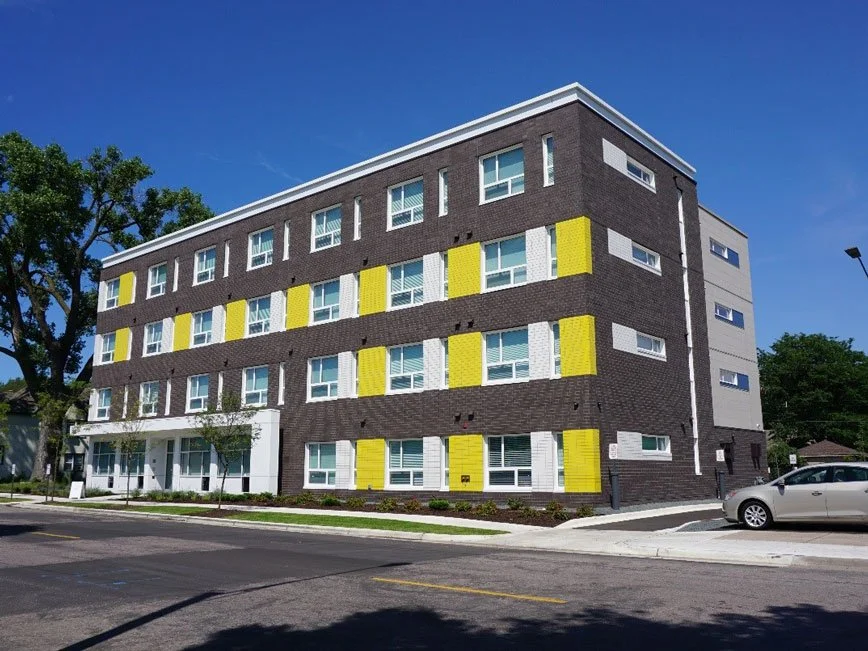Let’s Talk Policy: Affordable Housing
Source: Minneapolis Affordable Housing Trust Fund
An important issue I hear about regularly when door-knocking is the affordability and sustainability of housing in our city. We need to be an affordable place to rent or buy, and we also need to be a sustainable place to stay.
As regards new housing and affordability, Minneapolis is regarded by many as a national leader because of its inclusionary zoning policies and efforts such as the Affordable Housing Trust Fund. Personally, I am thrilled to see the emergence of private-public partnership plans unveiled like Northside Forward which is planning 3,800 new housing units over 10 years. But, while rents in Minneapolis are lower than in many comparison cities, a recent study from the Federal Reserve asserts this may be due in part to demand weakness, not supply growth, and notes that new multi-family housing construction has dropped dramatically since 2022.
One of the main reasons for this drop in production is the still-looming threat of rent control. The new council should take this off the table in a decisive, public way. Rent control has been a disaster for new housing production in St. Paul, where it passed, and the threat of it in Minneapolis is shutting off crucial financing for developers who would otherwise like to build here. Supply growth helps with lower rent prices, and we need that here in Minneapolis. Public safety matters too – I’ve spoken to more than one developer who says they are reluctant to commit to new projects here while the crime rate is still high.
But the issue is not just about initial affordability for residents, but also sustainability over the long term. One emerging sustainability concern is the use of algorithmic rent-setting software to influence our city rental rates. These tools use nonpublic competitor data around rent prices and occupancy levels to produce suggested rent calculations. As you might imagine, it is not popular with renters.
I recently heard from residents from the LPM Building in Loring Park about the impact this software was having on lease renewals in their building. Two renters, two floors apart, same square footage – one was offered a renewal at $264 more than the other. Management would not match the lower offer, but – in a crazy turn of events – the higher-renewal renter "beat"the algorithm by signing a new lease for a much larger and nicer unit on a higher floor for only $1 more! Back in January, the Department of Justice initiated a lawsuit against six of the largest landlords in the nation for participating in algorithmic pricing schemes that harmed renters. Five of those landlords operate in the Twin Cities.
In March of this year, our city council voted 11-2 in favor of banning the use of this software in our rental market, the mayor signed it, and the ban goes into effect next March. The Ward 7 incumbent voted AGAINST banning this rent-setting software. This is not how I would have voted as I know it is an important issue for residents who are renting.
Sustainability is also affected by rising property taxes, which impacts both renters and homeowners, since multi-unit owners simply add increases on to the rent. Last year in Ward 7, we had an average 13% increase in our property taxes, and that is just not sustainable. One person I spoke with had an 18.9% increase last year. The city is in the middle of budget work now, but we are likely to see more of the same for the coming year. While homeowners and multi-unit owners are willing to pay their fair share, the value we receive for the taxes we pay is increasingly being called into question.
We are struggling with delays in 911 response times, follow-up on property crimes, street maintenance and lighting outages, along with fewer local options for our business. Meanwhile, multi-unit owners are having to hire private security, and we are struggling to attract and keep young families because our public schools are increasingly not competitive with surrounding communities. In order to keep our residents here, we need to mitigate property tax increases and drive better efficiencies and value in our core city services.
We also need to protect residents from additional utility franchise fees. Currently the incumbent is leading discussions about increasing utility franchise fees in Minneapolis from approximately $10 million to $15 or $20 million. This is a city fee on utilities that is passed directly to consumers…residents, small restaurant owners, businesses. Minneapolis already has the highest franchise rates in Minnesota for both CenterPoint and Xcel, and these fees only add to the burden of property tax increases.
Gaining more funding for climate initiatives is a direction I support (and the rationale for these higher fees being invested in Green Zones), but we must be thoughtful about methods and timing. To put additional energy costs on residents and businesses right now, when property taxes are significantly on the rise and when natural gas and electricity costs are also likely to rise is simply not the right time. As we head into the next four years of fiscal challenges, we should tread carefully in putting additional “tariff-like” burdens on our residents.

